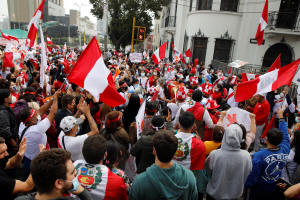Socialist Castillo clings on to tight lead in Peru election as count
nears end
 Send a link to a friend
Send a link to a friend
 [June 09, 2021]
By Marco Aquino and Marcelo Rochabrun [June 09, 2021]
By Marco Aquino and Marcelo Rochabrun
LIMA (Reuters) - Peruvian socialist
candidate Pedro Castillo held on to a narrow lead late on Tuesday in the
country's runoff presidential election, as tensions rose over contested
ballots and accusations of fraud, which sparked protests outside the
elections office.
Castillo, who has worried markets and mining firms with his plans to
shake up the copper-rich country's politics, held a slim lead of some
50.3%, ahead of right-wing rival Keiko Fujimori on 49.7%, with almost
98% of the votes tallied.
That amounts to a lead of 88,000 votes.
A preliminary count is likely to end on Wednesday, although about
300,000 votes have been contested https://www.reuters.com/
world/americas/could-perus-contested-votes-swing-election-2021-06-08
and will need to be reviewed by an electoral jury, which will take days
to resolve.

It is unclear whether those contested votes will be enough to swing the
election in favor of Fujimori, especially after Castillo modestly
broadened his lead during the day from as low as 70,000 votes.
On Monday, Fujimori made unsubstantiated accusations of fraud, adding
fuel to an already tense situation, and publicized a hashtag for Twitter
users to submit instances of what she called "irregularities."
Electoral experts, including international observers, told Reuters that
no fraud had been observed, but that did not stop people from staging
protests.
"We are protesting because of the flagrant electoral steal. The
(elections office) is playing in favor of Mr. Castillo, they are trying
to commit fraud in his favor," said Fernando Tavera, a pro-Fujimori
protester outside the elections office.
Castillo backers also flocked to the elections office to voice their
support in counter-protests. Both sets of demonstrations were peaceful.
Lourdes Morales, who supports Castillo, said, "We think it's a scandal
the way (Fujimori) has increased her voting numbers," referring to how
the conservative had slowly narrowed the gap on Castillo for most of the
day. "And that generates uncertainty," she said.
Lima is where Fujimori has the most support. Castillo, the son of
peasant farmers, had surged late in the count as more of the rural vote
came in, leading by over 100,000 votes at one point. However, buoyed by
international votes, Fujimori began to gain ground again.
Fujimori, the scion of a powerful political family, said she held out
hope of closing the narrow gap on Castillo on Monday night.
[to top of second column]
|

Supporters of Peru's presidential candidate Keiko Fujimori gather on
a street near the National Office of Electoral Processes after a
June 6 run-off election, in Lima, Peru June 8, 2021.
REUTERS/Sebastian Castaneda

Markets in Peru wobbled for a second day, after
dipping forcefully on Monday on the expectation that Castillo would
win. Peru's stock exchange fell 0.74%, although the local currency,
the Sol, strengthened 0.33%.
The drama has left Peruvians glued to media as they watch the tally.
But the final result could still be days away, and contested ballots
could be key.
There are some 1,385 contested 'actas,' or voting tables, which is
likely to equate to some 300,000 votes. They are set to be counted
by a special committee set up by the electoral board, which could
take at least a week.
If Castillo wins, investors will be looking to see whether he
reaches out to calm the country following the divisive election, and
what his early messaging is on economic policy direction and the
investment outlook, Goldman Sachs said.
Castillo has promised to redraft the constitution to strengthen the
role of the state and take a larger portion of profits from mining
firms. Fujimori has pledged to follow a free-market model and
maintain economic stability in Peru.
Azhar Hussain, Head of Global Credit at Royal London Asset
Management, said that market fears about Castillo were potentially
over-inflated.
"The (market) reaction to Peru is pretty muted," he said. "For a
start maybe we got trapped in the narrative that it was a binary
choice ... Maybe from a political point of view it is, but from a
real economic perspective it doesn't seem to be."
(Reporting by Marco Aquino and Marcelo Rochabrun in Lima; Additional
reporting by Marc Jones, Karin Strohecker and Tom Arnold in London
and Rodrigo Campos in New York; Writing by Adam Jourdan; Editing by
Rosalba O'Brien and Raju Gopalakrishnan)
[© 2021 Thomson Reuters. All rights
reserved.] Copyright 2021 Reuters. All rights reserved. This material may not be published,
broadcast, rewritten or redistributed.
Thompson Reuters is solely responsible for this content.
 |